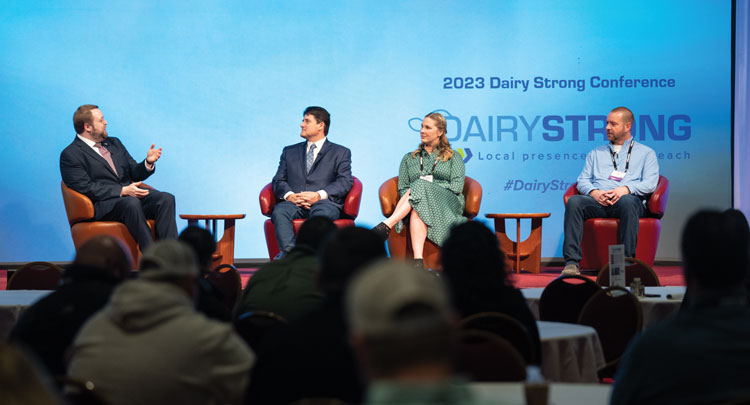
Anaerobic digesters are one way to capture more value from manure, but they come with a substantial price tag. Farm owners must consider the pros and cons before committing to this long-term investment.
During the Dairy Business Association’s Dairy Strong conference held in Madison, Wis., a panel of three dairy farmers discussed their vision of the industry in the next 10 years. Knowing that these three farms all operated anaerobic digesters, an audience member asked the panelists why they chose to go that route and what they hoped to get out of a digester on their dairy.
For Brian Houin of Homestead Dairy in Plymouth, Ind., he said they invested in a digester in part to improve the farm’s sustainability. “Our goal is to continue to work on our environmental stewardship and work toward net zero,” he said.
“Of course, we want there to be an economic return, too,” he continued. “We are all entrepreneurs. We want to invest in ourselves and our business.” The dairy made the financial investment in their first digester 10 years ago, and Houin said they’d likely go the independent route again rather than signing a long-term contract with a partner if they decide to install another one.
Christina Zuiderveen, a managing partner of Black Soil Dairy, Hope Dairy, and Dakota Plains Dairy, said that access to upfront dollars allowed them to invest in some expansion, including a digester. She also noted the need for the project to make economic sense. “We are running a business, and we need to be profitable,” she said.
As for benefits, installing a digester and a sand separation system on one of their dairies improved their manure management, along with cow comfort and bacteria counts. Zuiderveen also touched on the sustainability piece, noting that it is not a requirement but their processer encourages them to work toward environmentally friendly goals.
Lee Kinnard, a dairy farmer from Kewaunee, Wis., shared another reason why their family chose to go the anaerobic digester route.
“Digesters are very expensive, with a wide learning curve and a lot of things to understand. What attracted us was not the digester itself, but the technology that is available off the back of the digester,” he said. Kinnard is excited about options such as evaporative technology that can be used to condense digested manure into a denser product that is more cost-effective to transport to fields farther away if needed.
Their answers to the question placed sustainability, economic benefits, and technology opportunities at the top of the list for why these farms operate anaerobic digesters. A longer conversation with each producer would no doubt unearth many more benefits, challenges, and lessons learned.









